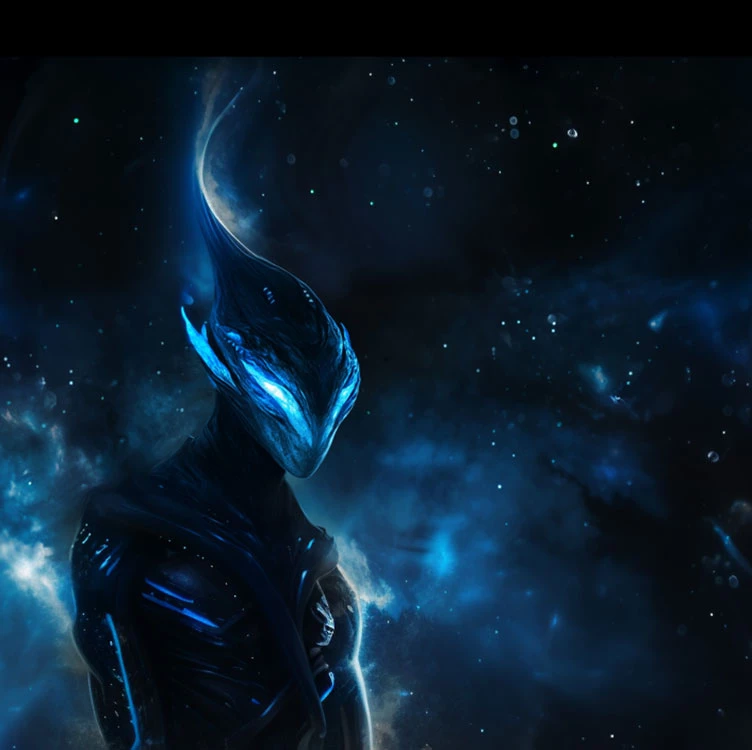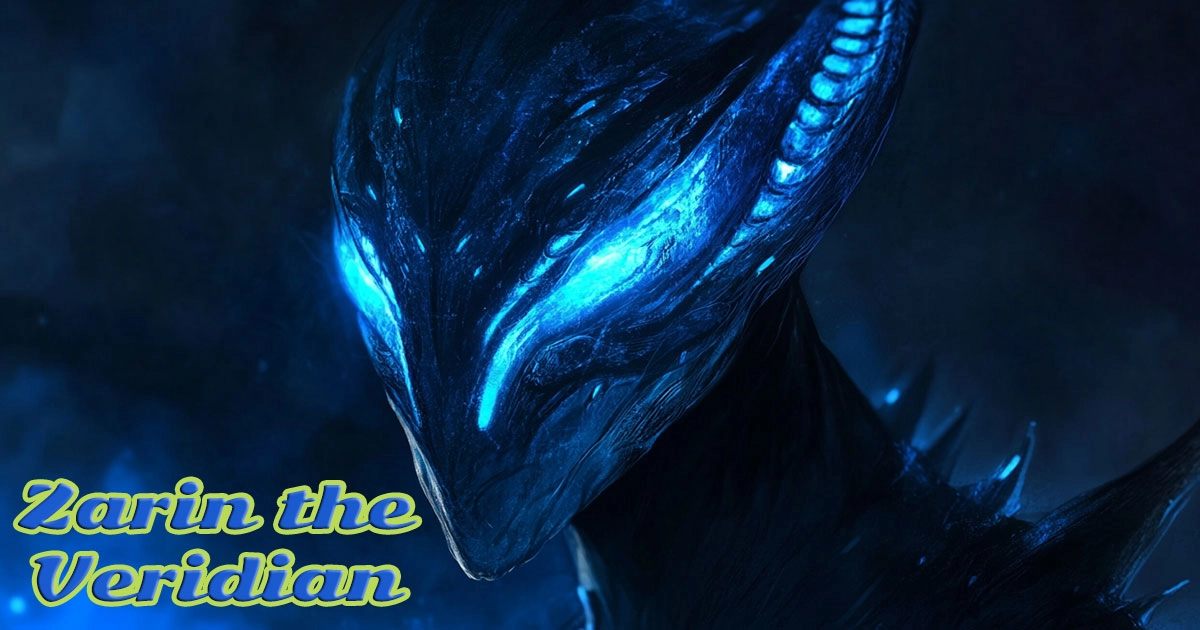Zarin the Veridian Visits Earth
Chapter 1: Arrival
Zarin's spacecraft shimmered into existence on the dark side of Earth's moon, its sleek, obsidian surface absorbing the ambient light. Hailing from the distant planet of Veridia, a lush world orbiting the gas giant Auroria, Zarin had traveled over 300 light-years to reach this distant blue dot. Veridia was a world where nature and technology coexisted in harmony, a planet where towering bioluminescent forests and advanced, sentient cities dotted the landscape. His was a society that valued unity, where governance was based on a collective consciousness—a system that was both alien and fascinatingly complex to Earth's civilizations.
For years, Zarin had intercepted radio signals sent from Earth, mesmerized by its myriad cultures, its diverse ecosystems, and most importantly, its varied systems of governance. Veridia’s collective governance ensured that every decision was made with the consensus of the entire population, a method that had sustained peace for millennia. In contrast, Earth's civilizations were fragmented, each nation-state governed by its own set of rules, ideologies, and leaders. The concept of individual governance, often wrought with conflict and competition, was an enigma to Zarin, and it was this curiosity that had driven him across the cosmos.
As Zarin's craft descended into the Earth's atmosphere, the traveler prepared for the journey ahead. The plan was simple: observe, interact, and understand how Earth’s civilization functioned, and how such a diverse planet managed to exist despite its fragmented nature.
Chapter 2: First Landing
Zarin chose to land in a secluded area within the Pacific Northwest of what Earthlings called the United States of America. The vast, dense forests reminded him of Veridia's wilds, albeit with less vibrancy. Stepping out of the craft, Zarin activated a cloaking device to avoid detection—Earth's inhabitants were not yet ready for a direct encounter with an extraterrestrial being.
As Zarin moved through the forest, he activated the Translation Module, a piece of technology that would allow him to understand and communicate in any of Earth's languages. It wasn’t long before Zarin reached the outskirts of a small town. The wooden houses and paved streets were primitive compared to Veridia’s living cities, but there was a charm to it—a simplicity that spoke of a deep connection to the natural world.
Zarin observed the townspeople from a distance, noting their interactions, their emotions, and their communal gatherings. What struck Zarin most was the apparent freedom of the individuals here; each person seemed to have their own thoughts, desires, and decisions, a stark contrast to Veridia’s collective decision-making process.
Seeking to understand more, Zarin infiltrated the local library at night. The records contained within spoke of the United States as a "democracy," a term that piqued Zarin's interest. Here, governance was determined by the will of the majority, with elected leaders representing the populace. Zarin marveled at the concept—on Veridia, the notion of electing an individual to lead was unheard of. How could one person embody the will of millions? It seemed an impossible task, yet the people here appeared to thrive under such a system, albeit not without its flaws.
Chapter 3: A World of Contrasts
Leaving the town, Zarin decided to explore more of Earth’s varied governance systems. The Translation Module led him to a city in East Asia, Beijing, where the governance was vastly different. The People’s Republic of China operated under a single-party system, a concept that intrigued Zarin even more. Here, the government exerted strong control over its citizens, and the collective good was often placed above individual desires—a concept more akin to Veridia, yet distinctly different in execution.
In Beijing, Zarin observed the efficiency and order that marked daily life. The government's presence was palpable, from the grand architectural designs that symbolized state power to the pervasive surveillance systems that monitored the populace. Zarin found this system both familiar and alien; on Veridia, the collective consciousness ensured everyone’s voice was heard, but here, a select few dictated the lives of billions. The stark difference in individual freedoms between this and the democratic system of the United States was a fascinating contrast, and Zarin could see both the strengths and weaknesses in each approach.
Zarin’s journey then took him to the Indian subcontinent, where he landed in New Delhi, the capital of the world's largest democracy. The sheer diversity of the populace—different languages, religions, and cultures—was overwhelming. India’s governance was a complex tapestry, one where numerous political parties, ideologies, and regional interests coexisted in a sometimes chaotic but functional manner. Zarin was particularly fascinated by the idea of federalism, where power was shared between central and regional governments, allowing for local autonomy while maintaining national unity. It was a delicate balance, one that required constant negotiation and compromise, and yet, it seemed to work.
Chapter 4: Shadows and Light
But not all of Zarin’s encounters were with well-functioning governments. The traveler ventured into regions where governance had collapsed or was in a state of disarray. In the war-torn regions of the Middle East, Zarin saw the devastating effects of civil war and the collapse of state structures. Here, the absence of a stable government had led to suffering and chaos, a stark reminder of what could happen when the delicate balance of governance was disrupted.
Zarin’s visit to these regions was sobering. The traveler had seen the grandeur of democracies, the efficiency of single-party states, and the vibrant chaos of federal systems, but here, in the ruins of what were once nations, Zarin saw the fragility of civilization. It was a stark contrast to Veridia, where collective governance ensured stability and peace. But here, on Earth, the absence of a governing body led to nothing but destruction.
Chapter 5: Reflections
As Zarin prepared to leave Earth, he reflected on all that he had observed. The diversity of Earth’s governance systems was both its strength and its weakness. In democracies, the freedom and voice of the individual were paramount, fostering innovation and progress but often at the cost of unity and efficiency. In more authoritarian systems, order and stability were prioritized, but at the risk of stifling individual freedoms. And in regions where governance had failed, the absence of structure led to chaos and suffering.
Zarin could see the benefits and pitfalls of each system, understanding that there was no perfect way to govern a diverse population. Earth’s civilizations were complex, with their governance systems evolving to meet the unique needs and histories of their people. This was a far cry from the collective governance of Veridia, where every decision was made with the input of all.
Yet, Zarin realized that it was this diversity, this constant push and pull between different ideologies and systems, that made Earth so fascinating. It was a planet of contrasts, where the light of innovation and the shadow of conflict coexisted, shaping the destiny of its people in ways that were both unpredictable and inspiring.

Chapter 6: Departure
As Zarin's spacecraft ascended from Earth’s surface, the traveler took one last look at the blue planet below. Earth was far from perfect, but it was a world teeming with life, ideas, and possibilities. Its people were resilient, constantly striving to improve their societies, even if it meant navigating through turmoil and strife.
Zarin knew that the journey to Earth had provided invaluable insights. The experience had shown that while Veridia's collective consciousness ensured unity and peace, Earth’s diversity of thought and governance spurred growth, adaptation, and resilience. Each system had its merits, and perhaps, there were lessons to be learned from both worlds.
With a sense of fulfillment, Zarin set a course back to Veridia, eager to share the knowledge gained from this distant world. Earth was a planet of contrasts, of challenges and triumphs, and it was this complexity that made it a marvel in the vastness of the universe. As the stars stretched out before the spacecraft, Zarin knew that Earth would not be the last stop on his journey of discovery, but it would always hold a special place in the annals of Veridia’s explorations.
For Earth, with all its imperfections, had shown Zarin the beauty of diversity, the strength in differences, and the endless possibilities that arose when a civilization embraced the complexities of governance and the indomitable spirit of its people.



